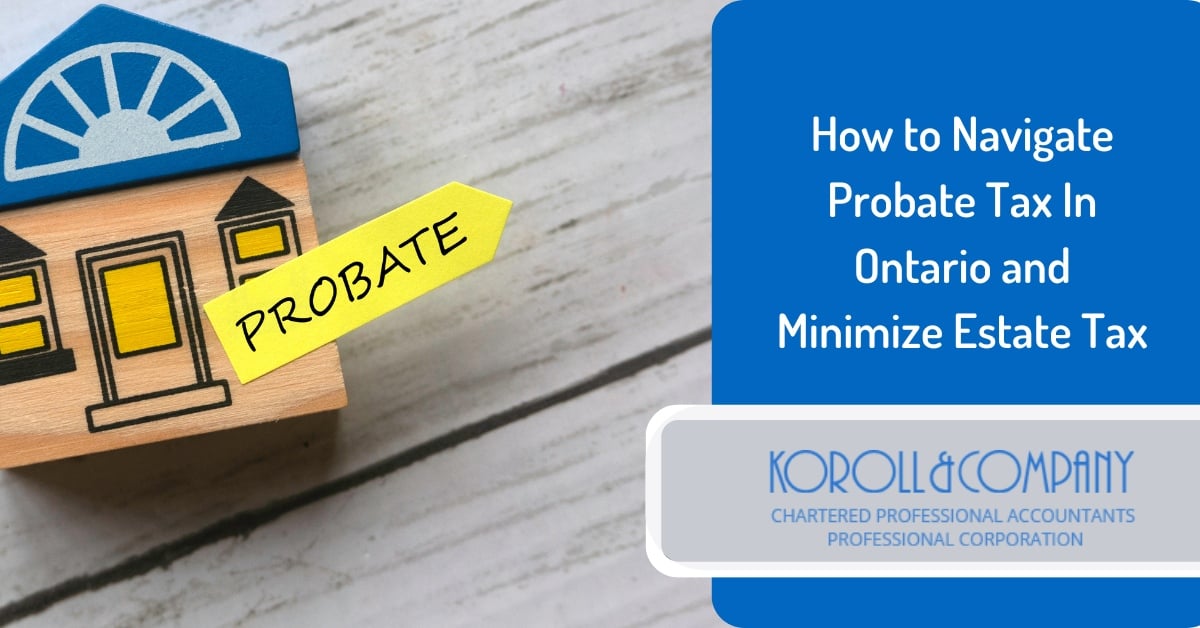 In the realm of estate administration in Ontario, Probate Tax, also known as Estate Administration Tax, poses a significant concern for estate lawyers and their clients.
In the realm of estate administration in Ontario, Probate Tax, also known as Estate Administration Tax, poses a significant concern for estate lawyers and their clients.
Understanding the intricacies of this tax and implementing effective probate planning strategies can substantially alleviate the burden of this financial obligation.
In this blog, we’ll delve into the fundamentals of Probate Tax and explore various planning opportunities that can help mitigate its impact on an estate.
What is Probate Tax?
Probate Tax, previously Estate Administration Tax, arises when an executor seeks a Certificate of Appointment of Estate Trustee to gain the authority to administer the estate of a deceased person. This process, commonly known as probating the will, establishes the validity of the will if the deceased had one.
The requirement for a Certificate of Appointment depends on the type of assets owned by the deceased at the time of death and whether they had a valid will.
Calculating Probate Tax
The computation of Probate Tax involves levying a 1.5% tax on the value of assets administered under the Will, exceeding $50,000.
For example, if the total assets governed by the will amounted to $1,050,000 when the individual passed away, the Probate Tax payable during the application process would be $15,000 (1.5% x ($1,050,000 – $50,000).
Some assets are not considered in this calculation, such as real estate located outside Ontario. For Ontario real estate, the value considered for the calculation excludes any encumbrances.
Minimizing Probate Tax For Your Family
Probate planning is a strategic approach to curtail Probate Tax exposure. Although diverse techniques can be employed, it’s essential to emphasize that each situation is unique, demanding individualized solutions.
Seeking guidance from qualified professionals is crucial before embarking on any Probate Tax reduction endeavor.
However, to give you an idea of available strategies, consider these scenarios:
#1 - There Are Multiple WillsOne prevalent probate planning strategy in Ontario involves the execution of multiple wills. This approach segregates assets into two distinct categories — a Secondary Will (or Non-probated Will) and a Primary Will (Probate Will).
The Secondary Will deals with assets that do not require a Certificate of Appointment for administration.
The Primary Will manages the distribution of remaining assets. By probating only the Primary Will, Probate Tax exposure is limited to the value of those specific assets.
For instance, let’s say the person who passed away is a business owner with $2,000,000 worth of shares in a private corporation. Other shareholders in the company do not require proof of the executor's authority. As such, if the Secondary Will governs the distribution of the business’s shares, the estate could save up to $30,000 in Probate Tax (1.5% x $2,000,000).
#2 - Bare Trust PlanningOntario law permits the division of legal and beneficial ownership, facilitating bare trust planning using a nominee corporation.
Under this strategy, the legal title of an asset is transferred to the Nominee, while the beneficial ownership remains with the original owner(s). On the owner's death, the legal ownership remains with the Nominee, and the beneficial ownership is transferred as per the Secondary Will.
Implementing this approach necessitates meticulously drafted multiple Wills and consideration of setup and maintenance costs.
#3 - Designating BeneficiariesDesignating beneficiaries, excluding the deceased's estate, on life insurance policies and registered investment accounts allows these assets to bypass probate and pass directly to the designated beneficiaries.
This measure ensures they do not form part of the deceased's estate and are exempt from Probate Tax. However, careful evaluation of how this designation aligns with the overall estate plan is necessary, considering potential tax implications and liquidity requirements.
#4 - There Are Joint AssetsHolding assets jointly so that they pass automatically to a surviving joint owner upon the first owner's death can effectively bypass Probate Tax. This strategy is commonly employed by spouses who own property as joint tenants with the right of survivorship.
It is, however, essential to exercise caution when adding joint owners, especially in parent-child scenarios, and to seek legal advice on potential risks and the need for multiple wills to implement this approach effectively.
The Importance of Probate Planning
Through careful and informed planning, it’s possible to navigate the complexities of Probate Tax and secure the financial well-being of an estate for future generations. But remember, the appropriateness of each probate tax approach hinges on the unique circumstances and preferences of the individual.
Engaging a qualified estate professional and staying vigilant of legal developments and administrative practices of relevant parties are vital to preserving the effectiveness of any probate planning strategy.
For help navigating Probate Tax in Ontario please contact Koroll & Company today.






